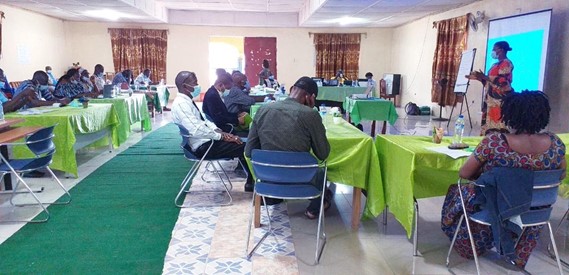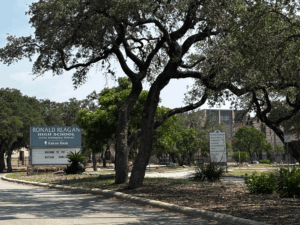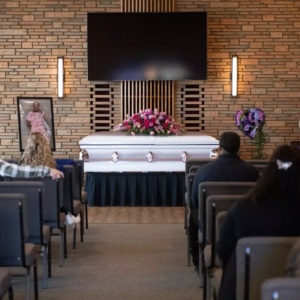
Carter Center’s Mental Health Program completes anti-stigma training for pharmacists in Liberia
A version of this article was originally published on The Bush Chicken, a media outlet dedicated to in-depth news and analysis on Liberia’s current events, development, and state of affairs.
By Zeze Ballah
Journalist, Mental Health Reporters’ Network, Liberia
The Carter Center’s Mental Health Program wrapped up final mental health and anti-stigma training for pharmacists in Liberia in March. The latest training included 19 pharmacists from the southeastern region of the country.
The training was organized in collaboration with the Ministry of Health’s Mental Health Unit in Grand Gedeh.
The final group of pharmacists trained was drawn from Grand Gedeh, Sinoe, Maryland, Grand Kru, River Gee, Nimba, and River Cess. In 2019, the Carter Center also trained 22 pharmacists in Gbarnga, Bong, and 30 other pharmacists from across the country, bringing the total number of pharmacists trained by the Carter Center to 71.
A 2012 survey of 45 pharmacists in Liberia revealed evidence of stigma and discrimination by pharmacists due to a lack of knowledge and myths surrounding mental, neurological and substance use conditions.
To tackle this, the Carter Center Mental Health Program collaborated with the Ministry of Health’s Mental Health Unit and conducted in-service training in 2013 for 30 pharmacists from across the country, drawing their attention to the important role they have to play in healthcare delivery. [Full disclosure: The author is a member of the Mental Health Reporters Network of Liberia, which is supported by the Carter Center.]
[Read more about the Carter Center’s work in mental health in Liberia]
The in-service training in 2013 eventually led to the development of mental health and anti-stigma training for several other pharmacists.
Strategic Objective Six of the National Mental Health Policy and Strategic Plan 2021 in Liberia mandates that all practicing pharmacists be trained in mental health to ensure better management and distribution of psychotropic medications, collaborative care, and the reduction of stigma and discrimination associated with mental illnesses.
Dr. Gorbee Gabriel Logan, assistant minister for Curative Services, who was the most senior figure from the ministry in Zwedru, said the Ebola epidemic outbreak in 2014 drew attention to mental health and psychosocial issues in the country.
Logan expressed gratitude to the Carter Center and Partners in Health (PIH) for supporting mental health programs in the country.
Grand Gedeh’s county health officer, Dr. Augustine Fannieh, called the training an “eye opener” that would enable pharmacists to understand and prioritize mental health issues, especially when making requisitions for drugs.
Fannieh advised the Carter Center and PIH to provide mental health drugs to health facilities in Grand Gedeh. He said many patients experience epilepsy in the county, and clinicians found it frustrating “to diagnose patients who need care and cannot provide the needed drugs.”
Angie Tarr-Nyakoon, director at the Health Ministry’s Mental Health Unit, emphasized that enhancing pharmacists’ training across the country is one of the key objectives of the National Mental Health Policy and Strategic Plan 2021.
She expressed the need for continuous in-service training in mental health and anti-stigma to the ministry’s partners. Tarr-Nyakoon saw a need to integrate mental health and anti-stigma training into the School of Pharmacy’s curriculum at the University of Liberia.
Tarr-Nyakoon also emphasized the importance of in-service training as it highlights integration and coordination between the pharmacists and mental health clinicians in the 15 counties.
Zeze Ballah made his journalism debut as a high school reporter at the LAMCO Area School System. In 2016 and 2017, the Press Union of Liberia awarded Zeze with the Photojournalist of the Year award. Zeze was also the union’s 2017 Health Reporter of the Year. He is a Health Journalism Fellow with Internews.



